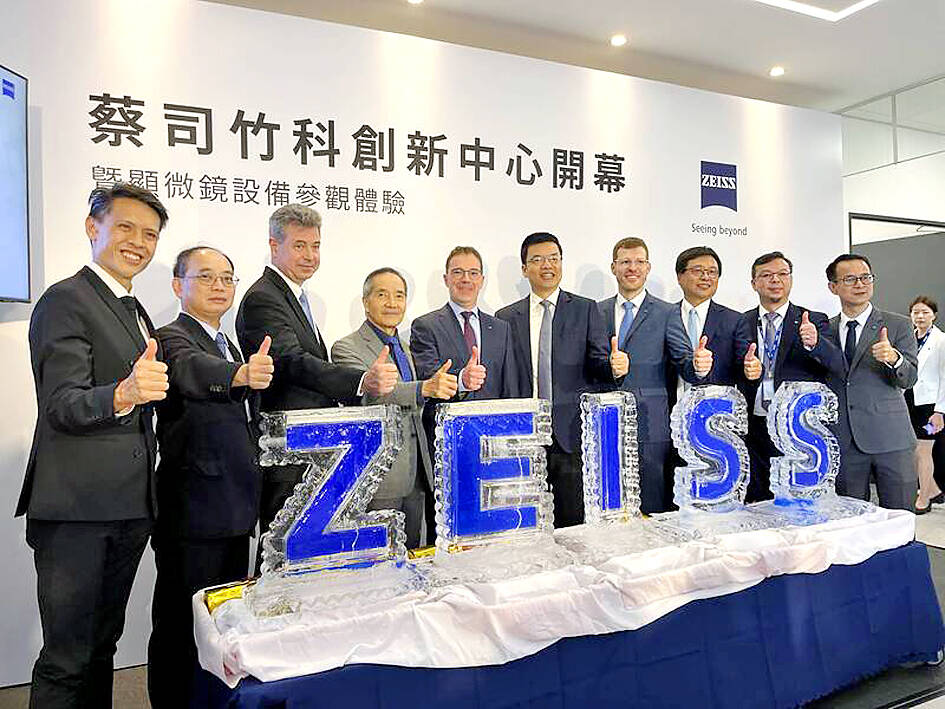Zeiss plans to accelerate its investment in Taiwan by injecting more than NT$10 billion (US $309 million) in the next 10 years after launching an innovation center in the Hsinchu Science Park (新竹科學園區) that would jointly develop advanced technologies with Taiwanese clients, the German manufacturer of optical systems and optoelectronics said yesterday.
In addition to the Hsinchu innovation center, the company has set up innovation centers in South Korea, the US and Germany.
Unlike other centers, the Taiwan center mainly focuses on developing solutions supporting next-generation process technologies and advanced packaging technologies because of the rapid uptake of artificial intelligence (AI) technology, Zeiss Taiwan head Cheong Peng Tat (章平達) said.

Photo: Grace Hung, Taipei Times
“This [investment] figure demonstrates our confidence in Taiwan's industries,” Cheong said. “We want to bring Zeiss's full portfolio to Taiwan.”
The innovation center costs NT$300 million, with a hefty investment in the semiconductor area, he said.
Zeiss Taiwan’s businesses cover five categories: semiconductor manufacturing technology, industrial quality and research, microscope, medical technology and consumer markets.
Zeiss Taiwan currently has 400 employees and plans to add 50 to 100 employees next year, Cheong said. The firm has more than tripled its headcount from 121 people in 2018.
Zeiss counts Taiwan Semiconductor Manufacturing Co (TSMC, 台積電) among its top customers. TSMC CEO C.C. Wei (魏哲家) visited Zeiss headquarters in Jena, Germany on May 16.
“TSMC has extensive collaboration with Zeiss from advanced technologies to now back-end,” He Jun (何軍), vice president of TSMC’s quality and reliability and operations, said at the center’s opening ceremony.
The Hsinchu innovation center introduces Zeiss’ latest electron microscope and light microscope technologies to serve its clients, targeting equipment used in the advanced semiconductor manufacturing processes from front-end to back-end.
3D X-ray microscopes, software solutions with artificial intelligence (AI) and other exclusive technologies for R&D and custom advanced workflows for failure analysis from wafer to package.

TAKING STOCK: A Taiwanese cookware firm in Vietnam urged customers to assess inventory or place orders early so shipments can reach the US while tariffs are paused Taiwanese businesses in Vietnam are exploring alternatives after the White House imposed a 46 percent import duty on Vietnamese goods, following US President Donald Trump’s announcement of “reciprocal” tariffs on the US’ trading partners. Lo Shih-liang (羅世良), chairman of Brico Industry Co (裕茂工業), a Taiwanese company that manufactures cast iron cookware and stove components in Vietnam, said that more than 40 percent of his business was tied to the US market, describing the constant US policy shifts as an emotional roller coaster. “I work during the day and stay up all night watching the news. I’ve been following US news until 3am

UNCERTAINTY: Innolux activated a stringent supply chain management mechanism, as it did during the COVID-19 pandemic, to ensure optimal inventory levels for customers Flat-panel display makers AUO Corp (友達) and Innolux Corp (群創) yesterday said that about 12 to 20 percent of their display business is at risk of potential US tariffs and that they would relocate production or shipment destinations to mitigate the levies’ effects. US tariffs would have a direct impact of US$200 million on AUO’s revenue, company chairman Paul Peng (彭雙浪) told reporters on the sidelines of the Touch Taiwan trade show in Taipei yesterday. That would make up about 12 percent of the company’s overall revenue. To cope with the tariff uncertainty, AUO plans to allocate its production to manufacturing facilities in

Six years ago, LVMH’s billionaire CEO Bernard Arnault and US President Donald Trump cut the blue ribbon on a factory in rural Texas that would make designer handbags for Louis Vuitton, one of the world’s best-known luxury brands. However, since the high-profile opening, the factory has faced a host of problems limiting production, 11 former Louis Vuitton employees said. The site has consistently ranked among the worst-performing for Louis Vuitton globally, “significantly” underperforming other facilities, said three former Louis Vuitton workers and a senior industry source, who cited internal rankings shared with staff. The plant’s problems — which have not

COLLABORATION: Given Taiwan’s key position in global supply chains, the US firm is discussing strategies with local partners and clients to deal with global uncertainties Advanced Micro Devices Inc (AMD) yesterday said it is meeting with local ecosystem partners, including Taiwan Semiconductor Manufacturing Co (TSMC, 台積電), to discuss strategies, including long-term manufacturing, to navigate uncertainties such as US tariffs, as Taiwan occupies an important position in global supply chains. AMD chief executive officer Lisa Su (蘇姿丰) told reporters that Taiwan is an important part of the chip designer’s ecosystem and she is discussing with partners and customers in Taiwan to forge strong collaborations on different areas during this critical period. AMD has just become the first artificial-intelligence (AI) server chip customer of TSMC to utilize its advanced